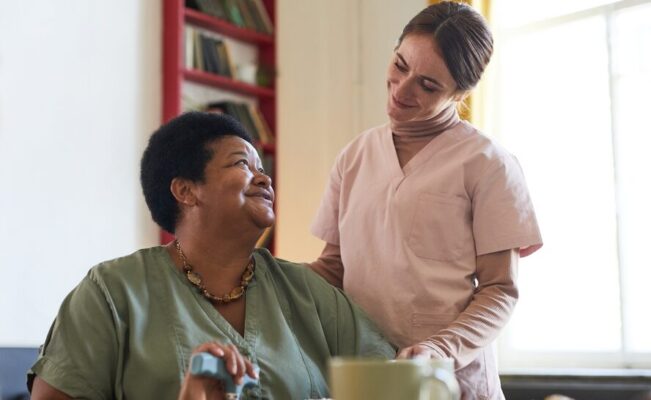- bocahomecare
- 0 Comments
When beginning to care for an aging parent, many adult children believe they can do it all. They may recently be empty nesters or recent retirees themselves, and feel they can throw themselves into caregiving nearly full-time. With the best intentions of keeping their elderly parents comfortable in their own homes instead of in an assisted living facility of some kind, it’s usually not long before they begin to experience some level of burnout.
The same holds true for a devoted husband or wife caring for a more fragile spouse.
Taking care of elderly parents or a spouse is a daunting task, fraught with daily pressure and sleepless nights. In an attempt to provide on-demand or significant hours of care, caregivers often neglect their own mental and physical health, leading to undue stress and accompanying adverse effects.
One more sustainable and effective solution to this challenge is the introduction of a home health aide for respite care. Such home care assistance offers a much-needed break for family caregivers. This respite care can span a day, a weekend, or even a week, depending on the family’s needs. It proves especially beneficial during instances when a caregiver requires medical attention or needs to address personal health issues.
The need for a respite from caring for aging parents isn’t solely dependent on the caregiver’s health. The daily pressure of caregiving can gradually lead to exhaustion. An occasional break through respite care can give the family caregiver the opportunity to unwind, rejuvenate, and step back from their duties momentarily. Regularly scheduled respite care – daily for a few hours or taking over for one or two days per week – can allow the primary family caregiver to attend to preventative self-care like going to the gym or social gatherings.
Regularly caring for a friend or family member has been shown to lead to depression, anxiety, health issues, and a sense of being overwhelmed. Taking regular breaks to attend to other needs is paramount, whether you are an adult child caring for a parent or a spouse taking care of a husband or wife. While a caregiver may feel guilty about stepping away, it’s important to understand that a well-rested caregiver is more effective. Home care professionals can also explain to the care receiver the advantages of their regular caregiver taking a break.
Even where respite assistance would be helpful to both the primary caregiver and the recipient, the aging individual may be initially uncomfortable with a non-family member in the house. We strongly recommend using care facilitated by a home health agency or nurse registry to ensure that the professional has undergone thorough screening and has both training and experience that match your loved one’s needs. These home aides can help with daily living activities, light meal preparation and occasional household chores, as well as play games or provide other mental stimulation for their clients. Family caregivers can rest easy knowing their loved ones are in capable hands during their absence. Indeed, the respite care will allow them to provide even better care when they are present.
Several types of respite care may be available depending on where your loved one lives, and we strongly encourage you to explore the options in your aging relative’s community. These may include adult day care services, home care services for varied durations, and even volunteer organizations offering low-cost or free services.
Regardless of the provider, the goal of respite care remains the same: offering family caregivers the much-needed opportunity to tend to their personal matters or engage in social functions. If your loved one lives in South Florida, please don’t hesitate to reach out to one of our care specialists who can provide you with recommended resources in our areas of service.
